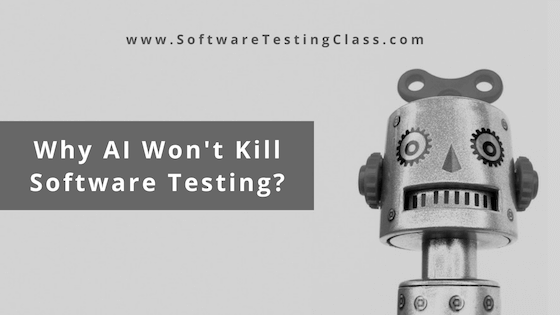Introduction
In this article, we are going to discuss the impact of Software Testing due to the introduction of machine learning and artificial intelligence. The introduction of machine-based intelligence will be the game changer to overcome the growing challenges to Software testing. It is the common belief of many software organizations that in the coming 5 years, AI and machine learning will have a significant impact on them.
AI-Enabled Testing can be thought of as an extension to the Test Automation due to the following reason.
Why AI Won’t Kill Software Testing?
- We are not going to get rid off Manual testing completely as there is no software developed without any bug in this world. Though today we have many robust test automation tools in every organization, the manual testing is always a part of testing strategy through which we can ensure high-quality user experiences.
- Over the period of time, as the software becomes more complex than before in its iterative releases, the test automation approach is the best approach in order to counter the need of frequent regression test on a large number of test cases in very less time. Automation test approach helps to unveil a large number of defects in very less time with the minimal testing effort.
- In the future, when the testing will be AI-Enabled testing then the automation will become ever smarter than before as we can feed a large quantity of data and make the machine learn to generate accurate test results and unveils the defects in the system. AI plays a very important role in vulnerability assessments through enhanced security, automatic code reviews, and the creation of the test cases automatically. So, the QA engineers just need to feed algorithms along with the historical data in order to increase the defects discovery rates. It can also provide real-time testing feedback on both functional as well as non-functional aspects of the software system under test.

The above evolution of testing from manual to AI-Enabled testing can be on the high rise but in the true sense, it is not at all going to kill the actual need of the QA engineers. The following are the reasons.
#1: The organization can use AI based automation tools such as Eggplant AI, etc. to cover the basic testing aspects of the mobile apps and such tools can easily help in the discovery of the defects by auto-generating the test cases through the learning algorithms and executing them on the mobile app. Such an approach is going to cover only the basic testing aspects as a part of the product development life cycle. If every organization is going to choose this path then they are going to miss the marvelous value that the highly qualified QA engineers can add to the product testing in terms of assessing the system salability, the security and risk management, the system performance, test documentation for the project, compliance, and tracking of various metrics. These all are human jobs that suit highly qualified QA engineers but not an AI-based testing tool.
#2: On the other hand, if the highly qualified QA engineers start using AI-Enabled testing then it will further add more stars to the product testing as well as the software quality. AI can help QA engineers to mitigate the human errors, unveil the testing areas which are often missed while preparing the test cases, early discovery of the defects, etc. AI can help QA engineers in the creation of the automated test cases by feeding algorithm and the historical data to the system. As a result, the QA engineers can reconcile the test cases and add more values to the overall software testing. In other words, AI-Enabled testing can be used as an addendum to the QA testing but it cannot be the replacement of the QA engineers.
=> The actual change that AI Enabled testing is going to bring in is the need of the highly qualified QA engineers who can deal with the AI systems and machine learning. The machine can be feed with the algorithm and the historical data to generate the test cases and user experiences automatically but if the software system has undergone some change then how is the machine going to behave with that data and who is going to correct or review the decision made by the AI Enabled tools? The answer is very simple that only well-qualified engineer can make very good use of this technology. Therefore, it can be seen more of a collaboration between QA engineers and the AI Enabled tools then the replacement of the QA engineers with the AI Enabled tools.
=> The self-learning patterns through the neural network can help in the testing but again they cannot replace the experience of QA engineers. Neural networks can be trained when they are put into learning mode but it does mean they have accrued ample experience to replace highly qualified QA engineers. A neural network which is in continuous learning mode could not be expected to do the security testing which is better known to a QA engineer dedicated for this type of testing.
=> AI-Enabled testing, no doubts it is going to bring revolution in the traditional software testing into a new digital age. At digital age, the AI-enabled testing is going to become a core part of QA (Quality Assurance) to ensure the Software or product quality but still, human testers will be required because only a human understand the needs of other humans but not the machine completely. Machine learning is still very far from developing common sense which is actually known to humans. Therefore, AI and machine learning in no way could be the replacement of Software testing by QA engineers in the product development lifecycle.
Conclusion
AI and machine learning are niche technologies and they are entering into every aspect of human life very rapidly. In the coming time, the use of AI enabled testing tools by highly qualified QA can add more value to the organization than before. There is a need of continuous enhancement of QA skills and this is the time to start learning AI and machine learning in order to use these technologies in the software testing to add more value towards the quality of the software product.
⇓ Subscribe Us ⇓
If you are not regular reader of this website then highly recommends you to Sign up for our free email newsletter!! Sign up just providing your email address below:
Happy Testing!!!
- Importance of Testing
- What should be done after a bug is found (Bug Defect Tracking)?
- Bug Life Cycle in Software Testing
- Software Testing Best Practices – Into The Basics Of Testing
- Why Many People Don’t Like Software Testing?
- Installation of TestNG in Eclipse – Selenium WebDriver Tutorial
- Are You Prepared: Interview Preparation Checklist
- Software Requirement Specification (SRS)
- Difference Between Static Testing And Dynamic Testing
- What is Digital Transformation In Software Testing?

2 thoughts on “Why AI Won’t Kill Software Testing?”
All actual testing is ‘manual.’ Testing can be supplemented by a tool which automatically checks points in the application for regression in functionality.
If these tools become more powerful and easier to use with less code, then what we’ll actually see is less of a demand for people who write and maintain these automated suites, not a decline in ‘manual testers.’ (i.e. real testers)
A couple clarifications, I made some mistakes in that comment:
Of course the tools can accomplish things that manual actions alone can’t do… and their purpose is not limited to just checking for regression in functionality, they have many more applications.
I also misspoke when comparing people who write automated suites to manual testers. What I was really referring to was a finer distinction, that is, testers who spend time learning and thinking about the application to make meaningful tests and experiments, vs testers that just write tests following a script and aren’t enthusiastically learning about the product.
The skills involved in writing good code to execute a set of predefined tests will probably be less appreciated as the tools get smarter and require less code, while the skills involved with planning, risk analysis, and systems thinking will always be appreciated.
It seems there’s a danger for a tester who does more coding than manual interacting to be less involved with learning more about the business and getting into the finer details and edge cases than someone who does more ‘manual work.’ But they’re not mutually exclusive either.
I’d love to hear what others think about this?